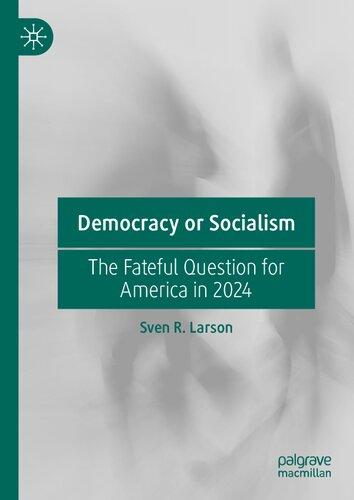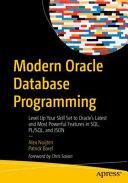https://ebookmass.com/product/socialism-scott-r-sehon/
Instant digital products (PDF, ePub, MOBI) ready for you
Download now and discover formats that fit your needs...
Defectors Erik R. Scott
https://ebookmass.com/product/defectors-erik-r-scott/
ebookmass.com
John Senior and the Restoration of Realism R. Scott Moreland
https://ebookmass.com/product/john-senior-and-the-restoration-ofrealism-r-scott-moreland/
ebookmass.com
Democracy Or Socialism: The Fateful Question For America In 2024 1st Edition Sven R. Larson
https://ebookmass.com/product/democracy-or-socialism-the-fatefulquestion-for-america-in-2024-1st-edition-sven-r-larson/
ebookmass.com
Post-Crisis European Cinema: White Men in Off-Modern Landscapes 1st ed. Edition György Kalmár
https://ebookmass.com/product/post-crisis-european-cinema-white-menin-off-modern-landscapes-1st-ed-edition-gyorgy-kalmar/
ebookmass.com
Mastering Digital Electronics: An Ultimate Guide to Logic Circuits and Advanced Circuitry 1st Edition Hubert Henry Ward
https://ebookmass.com/product/mastering-digital-electronics-anultimate-guide-to-logic-circuits-and-advanced-circuitry-1st-editionhubert-henry-ward/ ebookmass.com
Modern Oracle Database Programming: Level Up Your Skill
Set to Oracle’s Latest and Most Powerful Features in SQL, PL/SQL, and JSON 1st Edition Alex Nuijten
https://ebookmass.com/product/modern-oracle-database-programminglevel-up-your-skill-set-to-oracles-latest-and-most-powerful-featuresin-sql-pl-sql-and-json-1st-edition-alex-nuijten-2/ ebookmass.com
GIS and Geostatistical Techniques for Groundwater Science Senapathi Venkatramanan (Editor)
https://ebookmass.com/product/gis-and-geostatistical-techniques-forgroundwater-science-senapathi-venkatramanan-editor/
ebookmass.com
The Neighbor Wager Crystal Kaswell
https://ebookmass.com/product/the-neighbor-wager-crystal-kaswell/
ebookmass.com
Emerging Zoonotic and Wildlife Pathogens: Disease Ecology, Epidemiology, and Conservation Salkeld
https://ebookmass.com/product/emerging-zoonotic-and-wildlifepathogens-disease-ecology-epidemiology-and-conservation-salkeld/ ebookmass.com
Family Therapy: Concepts and Methods 11th Edition – Ebook
PDF Version
https://ebookmass.com/product/family-therapy-concepts-andmethods-11th-edition-ebook-pdf-version/
ebookmass.com
OceanofPDF.com
Oxford University Press is a department of the University of Oxford. It furthers the University’s objective of excellence in research, scholarship, and education by publishing worldwide. Oxford is a registered trade mark of Oxford University Press in the UK and certain other countries.
Published in the United States of America by Oxford University Press 198 Madison Avenue, New York, NY 10016, United States of America.
© Oxford University Press 2024
All rights reserved. No part of this publication may be reproduced, stored in a retrieval system, or transmitted, in any form or by any means, without the prior permission in writing of Oxford University Press, or as expressly permitted by law, by license, or under terms agreed with the appropriate reproduction rights organization. Inquiries concerning reproduction outside the scope of the above should be sent to the Rights Department, Oxford University Press, at the address above.
You must not circulate this work in any other form and you must impose this same condition on any acquirer.
CIP data is on file at the Library of Congress
ISBN 978–0–19–775334–7 (pbk.)
ISBN 978–0–19–775333–0 (hbk.)
ISBN 978–0–19–775336–1 (epub.)
DOI: 10.1093/oso/9780197753330.001.0001
OceanofPDF.com
Formymother,VeraDellwig,andinmemoryofmygrandfather,Will H.Hayden. OceanofPDF.com
Contents
Acknowledgments
PART I. INTRODUCTION
1. Logic and Arguments
Argument AdHominem
What Is an Argument?
A Sample: Socialism and Starvation
A Look Ahead
Key Takeaways
2. Defining “Socialism”
Don’t Argue about Words
It All Comes in Degrees
The Classical View
Some Rough Distinctions
Scandinavia and Democratic Socialism
Key Takeaways
3. Moral Philosophy Background and the Master Arguments
The Fundamental Question
A Moral Framework
Promoting Well-Being
Rights
Key Takeaways
PART II. RIGHTS-BASED ARGUMENTS
4. Does Socialism Violate Rights?
Socialism and Political Rights
Socialism and Economic Rights
Self-Ownership and the Nonaggression Principle
Self-Authorship and Economic Rights
Key Takeaways
5. Does Capitalism Violate Rights?
Extraction of Surplus Value: The Basic Idea
Initial Attempts at an Argument
Filling the Gap in the Argument: The Exploitation Principle
Final Version of the Argument
Evaluating Premise (2) of CapitalismExploits: Is the Distribution Undeserved?
Evaluating Premise (1) of CapitalismExploits:Is It Unfair?
Key Takeaways
PART III. SOCIALISM AND HUMAN WELL-BEING
6. The Progress Argument
Empirical Evidence and the Master Arguments
Humanity’s Spectacular Progress
Capitalism as the Explanation?
Correlation versus Causation and the Capitalist Argument
Testing the Capitalist Hypothesis: Data from 20th-Century Co mmunism
Science and Technology as the Real Explanation
Key Takeaways
7. Redistribution: Inequality and Envy
The Pettiness of Envy
Diminishing Marginal Utility versus Incentives
The Empirical Evidence: Optimal Rates of Taxation
Inequality Is Toxic
Key Takeaways
8. Collective Control: The Democracy Argument
Empirical Correlations: Scandinavia Again
Community versus Competitiveness
Why Is Democracy Good? The AllAffectedPrinciple
Democracy and Traditional Governmental Functions
Democracy and Economic Decisions
Market Socialism
Markets and the Capitalist Reply to the DemocracyArgument
forSocialism
Key Takeaways
PART IV. CAPITALISM AND HUMAN WELL-BEING
9. The Case for Markets
Hayek: The Better Information Argument
Friedman: The Better Incentives Argument
Key Takeaways
10. Market Failures I: Public Goods
The Argumentative Situation
Hayek and the Diffuse Benefit of Some Services
Applications
Key Takeaways
11. Market Failures II: Monopolies and Monopsonies
Monopolies
Where Shopping Is Impractical
Monopsony and Labor
“Government Is Not the Solution”?
Key Takeaways
12. Market Failures III: Neighborhood Effects and Climate Change
Negative Externalities and Neighborhood Effects
Other Examples
The No-Brainer? Future Generations and Climate Change
Key Takeaways
13. Conclusion
ABriefAnnotatedSelectionofSuggestedReadings Index OceanofPDF.com
1
Logic and Arguments
This book is a logicalintroduction to socialism. As opposed to what? you might ask. An illogical introduction? By promising a logical introduction, I mean that I plan to introduce you to the arguments for and against socialism, where an argument is characterized by clearly identified premises that purport to logically imply a conclusion. (More on the nature of arguments below.)
One way of introducing the arguments about socialism would be to stay studiously neutral: present the reasons and inferences offered by the opposing sides but take no stand on who is right. That will not be my approach. I will indicate which arguments I think work and which do not, and I will ultimately come down on the side of socialism: that we should move our political and economic systems in a strongly socialist direction. And I will try to convince you that the arguments support this conclusion.
On the other hand, this book is still meant as a general introduction to the contemporary arguments concerning socialism and capitalism. If this were simply a polemic in favor of socialism, then I would present those arguments for socialism that I think work, and I would aim to defeat prominent arguments for capitalism and against socialism. I would not bother to present arguments for socialism that, in my opinion, are dubious, even if they have currency among socialists. In fact, I will examine a broad array of arguments for and against socialism, and I will make an effort to cover some of those that have historically (or more recently) been given for socialism, even when I don’t think those arguments are successful. In this respect, the book is more neutral.
Nonetheless, this book is not an introduction to socialism in a broader or more historical sense: I will not be taking you back to the writings of Karl Marx or the earlier utopian socialists, and I will not be providing anything like a history of socialist movements or even of socialist thought. Not that there is anything wrong with such historical introductions, and I can recommend a number of them if that’s where your interest lies (see the “Suggested Readings” section at the end of the book). But this book is about the reasons for adopting socialist policies now, in our current political context; it is an introduction to the logic of the arguments for and against socialism. The arguments I present and analyze will draw on considerations and evidence from a number of fields: contemporary politics, economics, anthropology, psychology, and my own field of philosophy. Nonetheless, the book is still an introduction, not a specialized work of scholarship.
Argument AdHominem
This book is for people willing to go beyond slogans and dig deeply into the arguments, both for and against socialism. I’ll try to make a case for socialism by convincing you that certain arguments for it are sound and that the arguments typically raised against it are unsound. I’ll say more in Chapter 2 about what I mean by “argument” and by the technical terms “sound” and “unsound.”
Analyzing arguments is not always easy. A. E. Housman is widely cited as having written the following: “A moment’s thought would have shown him. But a moment is a long time, and thought is a painful process.” I’m often reminded of this quotation when I hear people talking about political issues. Especially in the United States but also in the United Kingdom and the rest of Europe, we live in polarized worlds, where your chosen political camp conveniently tells you what to think about almost everything. Questioning that orthodoxy can lead to accusations of betrayal or fear of being canceled. When people do happen to run across evidence or arguments for the other side’s position, they tend to dismiss them
without engaging in any serious way. Perhaps they think, “I’m sure I could find a different article making my side’s point, so I don’t need to think about this.” Or perhaps they just attack the source of the argument: if the source is not from their side, then it is biased, stupid, or evil.
This latter reaction, of attacking the source of an argument, even has a name: argument ad hominem. Despite having taught logic classes for decades, I’m not actually a big fan of classifying bad arguments into different types of fallacies and especially not of the tendency to refer to them by Latin names. But “ad hominem” is a useful phrase. Translated literally, it means “to the man” or “to the person,” but, in the context of arguments, it means this: responding to an argument by making claims about the person who made the argument rather than the argument itself.
I should note that there are times when dismissing the source of an argument is not really a fallacy and makes reasonable sense. I have a friend in Germany who is a font of misinformation and halftruths concerning climate change, 9/11, and other topics; Gerhard never met a conspiracy theory he didn’t like. If Gerhard tells me about a good Hausbrauereiin Freiburg, I will believe him, but when he presents data in favor of climate change denial, I have learned to be suspicious of his alleged facts.
But when someone makes an explicit argument and appeals only to facts that you accept or can confirm, then it makes far less sense for you to reject the argument simply because the person presenting it is not in your political camp. I can, of course, understand the attraction of ad hominem attacks: if you don’t know how to refute an argument, but you do know how to make accusations about the person making the argument, then it is tempting to let the latter substitute for the former. In principle, however, we should be able to evaluate arguments irrespective of the source. If an argument is a good one, then it doesn’t matter whether it was produced by Albert Einstein or monkeys randomly hitting the keys of a typewriter. (For the record, I will note that Einstein was a socialist. I’m not sure about the monkeys.)
Within political debates, especially in the United States, ad hominemattacks often come in the form of conservatives dismissing ideas or arguments because they come from the “liberal elite,” where this latter term typically refers to those espousing liberal views who are upper middle-class people with degrees from fancy private universities and who are thought to be out of touch with real people—you know, those Americans who work hard, own guns, and drink Bud Light. I say this because I know that some people will have a tendency to reject anything that I say in this book on the grounds that I am part of that hated liberal elite. And I am. For nearly 30 years I have been a philosophy professor at a prestigious East Coast liberal arts college, teaching logic and all kinds of other philosophical material. I have a BA from Harvard and a PhD from Princeton. Although I think I work hard, I don’t have any firearms, and I drink artisanal craft beer and hard-to-find imported German pilseners.
However, for those who would hold all of that against me, I might also mention a few further aspects of my background. I grew up in the deeply red state of Kansas. The last Democrat to receive Kansas’s electoral votes was Lyndon Johnson in 1964, and I was way too young to remember that election. My roots are middle class. My parents could only afford to send me to Harvard because Harvard offered significant financial aid. My grandfather and many members of my extended family were (and some still are) farmers. Throughout high school, I had a job working for minimum wage at a local janitorial supply company. My summers were otherwise occupied playing baseball and fishing in my grandfather’s farm ponds. I was never very good at either; my older brother was the far better fisherman, and my younger brother the far better baseball player. My lack of talent in baseball was undoubtedly a disappointment to my father, a conservative Republican who made his living as a baseball talent scout. In the offseason, Dad would pick up extra money by refereeing high school football games and occasional basketball games. I absorbed some liberal political perspective from my mother and my grandfather as a kid, but Kansas was not a particularly hospitable place for such views.
So, between my current position and my background, you have ammunition for two very different sorts of ad hominem attacks on me. You could dismiss anything I say because I am an eggheaded, East Coast intellectual. Or you could dismiss anything I say because I am an unsophisticated hick from Kansas. Or you could simply read the arguments, check the references for facts, and make up your own mind. I promise I will not exercise my philosopher-Jedi mind tricks on you. (I don’t actually have any such tricks. I sometimes wish I did, but then I would undoubtedly get distracted with long hours of thinking through the ethical issues of when, if at all, it is okay to use such mind control. I might also contemplate using it on myself when that seemed advantageous. Then I would start worrying about whether my past self has already done so. Actually, the more I think about it, the more I am sure it is a good thing that I have no such abilities.)
What Is an Argument?
What exactly does it mean to consider the arguments for and against socialism? What is an argument? One might start with a famous treatment of the issue from the iconic British comedy group Monty Python. In their sketch, a man (played by Michael Palin) walks into an office where you can pay to have an argument. He gives his money to buy a five-minute argument from a character played by John Cleese, who immediately begins to contradict everything Palin says. The Palin character complains, “An argument is not the same as contradiction.” Cleese answers, “It can be.” Palin replies: “No it can’t. An argument is a connected series of statements to establish a definite proposition.”1
The word “argument” can clearly be used in different senses. One might agree with the John Cleese character that in one sense of the term, mere contradiction is an argument. In another sense of the term, perhaps an old married couple hurling unrelated insults can also be said to be having an argument. In the context of a moral or political debate, simple gainsaying and exchanging insults might or
might not have a place, but it is not an application of reason and logic. The sense of the word “argument” that I have in mind is very close to that proposed by the Michael Palin character in the skit: “An argument is a connected series of statements to establish a definite proposition.” Specifically, I will take an argument to be a series of premises—claims assumed to be true—along with a conclusion that is said to follow logically from those premises.
Here is a very simple example of an argument: all people are mortal; Alexandria Ocasio-Cortez is a person; therefore, Alexandria Ocasio-Cortez is mortal. The argument has two premises, each of which is, I am pretty sure, true; and the conclusion follows logically from the premises. I will often lay out arguments in very explicit form as follows:
Ocasio-Cortez
) ) )
All people are mortal. [P]
Alexandria Ocasio-Cortez is a person. [P]
Alexandria Ocasio-Cortez is mortal. [1,2]
The “[P]” at the end of steps (1) and (2) indicates that those claims are assumed as premises for the sake of this argument. The “[1,2]” at the end of step (3) indicates that this line is taken to follow logically from lines (1) and (2). Laying out arguments in numbered step form has some very clear advantages: we can see exactly what is assumed to be true, and we can see exactly what is being claimed to follow logically from those premises.
The latter idea—of one statement followinglogically from one or more other statements—is critical. When I say that I am providing a logical introduction to socialism, I mean “logical” in a very specific sense. When one hears the term “logical,” one might conjure up images of Star Trek’s Mr. Spock, calmly and coolly reasoning, as if the ideal is to drain any emotion from one’s reasoning. That’s not what I have in mind. In the specific sense in which I am using the concept, “logical” is a term that applies (or fails to apply) to the
argument itself, irrespective of the emotional state of the person presenting the argument. One could very calmly and coolly reason in a grotesquely fallacious manner, or one could scream out a perfectly valid syllogism even in the throes of passion.
In the argument I have denoted as Ocasio-Cortez, statements (1) and (2) logically imply (3) in the following sense: given the assumed truth of any two statements of the same form as (1) and (2), the statement of the corresponding form of (3) would have to be true. The fact that (3) follows logically from (1) and (2) has nothing to do with the nature of mortality or Alexandria Ocasio-Cortez; any two statements of the same form would imply the corresponding third statement. It is not possible that (1) and (2) could be true while (3) is false, and we can see this simply by looking at the form rather than the specific contentof the statements. For example:
Scholz
All German politicians are human beings. [P]
Olaf Scholz is a German politician. [P]
Olaf Scholz is a human being. [1,2]
Here is another argument of the same logical form:
Mets Fans
All Mets fans are long-suffering. [P]
Scott is a Mets fan. [P]
Scott is long-suffering. [1,2]
The arguments Ocasio-Cortez, Scholz, and MetsFanshave the same form. In completely abstract form it is this:
Anything that is Ais B. [P]
x is A. [P]
x is B. [1,2]
And this form of argument is valid, meaning precisely that any conclusion of the form of (3) logically follows from the premises of the form of (1) and (2). For example, even those inclined to doubt the conclusion of Scholz have to admit that the conclusion does follow from the premises; if the premises are true, then the conclusion mustbe true.
Indeed, an argument can be valid (in the sense just defined) and thus perfectly logical, even if we know that one or more of the premises is false. For example:
Beards
) ) )
All socialists have beards. [P] Karl Marx is a socialist. [P] Karl Marx has a beard. [1,2]
This argument follows the same form, and if the premises are true, then the conclusion would have to be true. So it counts as valid. Moreover, the conclusion is in fact true. However, the first premise of the argument is clearly false—Alexandra Kollontai and Rosa Luxemburg were socialists without beards. So, although Beards is valid, it is not sound, where we define “sound” to mean a valid argument whose premises are true.
There are only two ways in which an argument could fail to be sound: either one or more of its premises could be false, or one or more of its claimed inferences could be logically fallacious. For example:
Vaudeville
If Karl Marx was a vaudeville comedian, then he was an entertainer. [P] Karl Marx was not a vaudeville comedian. [P] Karl Marx was not an entertainer. [1,2]
Both premises of Vaudevilleare true, as is the conclusion (though I rather like the image of Karl Marx tap-dancing). But the argument is nonetheless invalid, because the premises do not logically imply the truth of the conclusion. Here is a parallel argument to make the fallacy clearer:
No Clouds
If it is raining, then there are clouds in the sky. [P] It is not raining. [P]
There are no clouds in the sky. [1,2]
Premise (1) is true: if it is raining, then there are clouds. But we also know that there can be cloudy days with no rain; so (1) and (2) must not actually imply that there are no clouds in the sky. Both No Clouds and Vaudeville fail to be valid arguments. Of course, the mere fact that an argument is invalid does not show that its conclusion is false. Perhaps there are no clouds in the sky, and it is true that Karl Marx was no entertainer; but the arguments above do not establish those propositions.
In Vaudeville and No Clouds, there was an identifiable fallacy. In abstract terms, those arguments both had this form:
If p, then q. [P]
Not-p. [P]
Not-q. [1,2]
And both examples show that this form of argument is indeed fallacious, in the sense that it is possible for the premises to be true while the conclusion is false. This particular type of fallacy even has a name: denying the antecedent. However, I will typically not be concerned with naming fallacies or with specifying the abstract logical form of arguments using variables. Most informal arguments, if they are invalid, have a relatively simple problem: the premises don’t imply the conclusion because the argument fails to include a needed implicit premise.
A Sample: Socialism and Starvation
I’ll give you an example of the sort of argumentative analysis we can do with these tools. One tactic you often see against socialism in the comments section of a social media post: whenever someone says something good about socialism, just bring up starving people in Venezuela. A cartoon by A. F. Branco illustrates the idea.2 On the left side of the drawing one sees a scraggly young white man with bad posture, six whiskers on his chin, and a sign saying, “Feel the Bern”; the young man’s dialogue bubble reads, “dude!” Next to him is a middle-aged man wearing ragged and dirty clothes with “Venezuela” written on his shirt. The man holds a sign saying, “Hungry Please Help!” and he says in answer to the Bernie Bro: “been there done that. ” The implicit idea is that Bernie Sanders’s socialist ideas have been tried in Venezuela, and they led to widespread hunger, or, at least, food insecurity. If we try to see some sort of argument against socialism embodied in the cartoon, we could start by reconstructing it this way:
Socialism andStarvation 1.0
Venezuela has a socialist economic system and Venezuela has rampant food insecurity. [P]
Socialist governments should be rejected. [1]
) ) )
However, this argument is clearly not valid; (2) does not follow logically from (1), for the argument does not contain a premise making any sort of connection between food insecurity and the claim that socialism should be rejected. Branco would need to fill in the gap in some way to make the conclusion logically follow from the premises. For example, one might rerun the argument with an intermediate premise:
Socialism andStarvation 2.0
Venezuela has a socialist economic system, and Venezuela has rampant food insecurity. [P]
If there are countries with an economic system of type X that have rampant food insecurity, then economic systems of type Xshould be rejected. [P] Socialist economic systems should be rejected. [1,2]
Now the conclusion indeed follows logically. Premise (2) is a universal proposition about any sort of system of government, claiming that if some countries with that system of government have rampant food insecurity, then that system should be rejected. That premise, combined with (1), would indeed logically imply that socialist governments should be rejected.
Let’s set aside the question of whether premise (1) is actually true, whether Venezuela is socialist. Even if we granted Branco that point, he has a different problem: premise (2) of his argument can be used against capitalism, for we need merely note that there are countries with capitalist economic systems that also have food insecurity. For example, the country of Botswana is widely regarded as capitalist,3 but it has food insecurity issues. According to the Global Food Insecurity Index, run by the British publication The Economist, 22% of the population is undernourished, meaning that they do not receive the minimum number of calories required for an average person.4 In fact, even in the United States, over 10% of households are deemed “food insecure” by the US Department of Agriculture, where by this they mean that these households did not
) ) )
always have “enough food for an active, healthy life for all household members.”5 Perhaps we could agree not to count the United States as an instance of rampantfoodinsecurity, since 10% of households not always having enough food for an active, healthy life is not as bad as having more than one in four individuals be undernourished. So, to show the problem for Branco’s argument, we will go with Botswana:
Capitalism andStarvation
Botswana has a capitalist economic system and Botswana has rampant food insecurity. [P]
If there are countries with an economic system of type X that have rampant food insecurity, then economic systems of type Xshould be rejected. [P] Capitalist economic systems should be rejected. [1,2]
The cartoonist Branco, and other defenders of capitalism, can protest that Botswana and Venezuela are different sorts of cases. There certainly are many differences between Botswana and Venezuela. Botswana is in Africa and Venezuela is not; Botswana’s name starts with a “B” whereas “Venezuela” starts with a “V.” My point: there are always differences between any two distinct things. But the differences between these two countries are utterly irrelevant to evaluating Capitalism and Starvation. Premise (1) of CapitalismandStarvationis true. The two premises of the argument do logically imply the conclusion that capitalist economic systems should be rejected. If defenders of capitalism want to reject that conclusion, they must deny premise (2); they have no other choice. But premise (2) of CapitalismandStarvation is exactly the same as Branco’s own premise in SocialismandStarvation2.0. Is he going to deny the premise when it appears in Capitalism and Starvation but affirm it when the very same claim is made in Socialism and Starvation? That would be simply inconsistent and logically contradictory.
So Branco will probably want a different intermediate premise— some other way of connecting the existence of starvation in Venezuela to the claim that socialism should be rejected. One might complain that Botswana is but one minor example of a capitalist country and point out that it is surely not enough to say (as does premise (2) in both arguments) that the mere existence of an example or two of a country with an economic system of type X having widespread hunger does not mean that the economic system is to blame. Branco might, for example, revamp (2) as follows:
(2) If all countries with an economic system of type X have rampant food insecurity, then economic systems of type Xshould be rejected.
But now, to make SocialismandStarvationstill be valid, he needs to change premise (1) as well, and have it claim that all socialist countries have rampant food insecurity:
Socialism andStarvation 3.0
All countries with socialist economic systems have rampant food insecurity. [P] If all countries with an economic system of type X have rampant food insecurity, then economic systems of type Xshould be rejected. [P] Socialist economic systems should be rejected. [1,2]
This version is valid (the conclusion follows logically from the premises), but now mere mention of Venezuela and its problems does not support premise (1). We would need to know which countries count as socialist and then investigate the existence of food insecurity in each of them. Indeed, premise (1) seems obviously false: even ignoring controversial cases for the moment (e.g., whether the Nordic countries count as socialist), I need merely point out that Cuba (which Branco presumably counts as socialist) does not have rampant food insecurity (the International Food Policy Research Institute said that Cuba’s Global Hunger Index was “very low”).6
) ) )
So, to sum up the situation so far, all three versions of Socialism andStarvationfail. Here were the results:
Version: Problem:
1.0 Clearly not valid.
2.0 Premise (2) would also imply that capitalism should be rejected as shown by Capitalism and Starvation; so the conservative will want to reject (2).
3.0 Premise (1) is obviously false.
One thing Branco or other antisocialists might try: take the plausible premises from each version of the argument and put them together this way:
Socialism andStarvation 4.0
Venezuela has a socialist economic system, and Venezuela has rampant food insecurity. [P]
If all countries with an economic system of type X have rampant food insecurity, then economic systems of type Xshould be rejected. [P] Socialist economic systems should be rejected. [1,2]
Now both premises (1) and (2) are plausible. But the conclusion no longer follows; version 4.0 is logically invalid: premise (2) allows us to say that if all socialist countries have rampant food insecurity, then we should reject socialism; but premise (1) only gives a single example, rather than even attempting to claim that this is a feature of all socialist countries.
So, when Branco and other conservatives think they can refute socialism just by making quick references to Venezuela, what do they have in mind? What isthe argument? What are they thinking? I honestly don’t know. One might suggest that they are illegitimately sliding back and forth between the versions: when one points out the problem with 2.0, they move to 3.0; when they see the problem with 3.0, they move to 4.0; when one points out the logical problem with 4.0, they slide back to 2.0; and around they go.
To be clear, I have not in this chapter presented any sort of argument forsocialism, nor have I by any means refuted all possible arguments against socialism. A more serious effort could, for example, try to marshal systematic evidence that the more socialist a system is, the more food insecurity results. But that would be an entirely different argument. Venezuela would merely be one data point, as would Botswana. Later in the book, I will be looking at evidence in a systematic fashion like this, attempting to make the case that socialism actually leads to better health and well-being outcomes. The point here is that some antisocialists think that they can refute socialism without bothering with any careful analysis of that sort, that they need merely point to Venezuela. They may think they gained rhetorical points and somehow scored a “gotcha,” but mere reference to Venezuela provides no coherent argument against socialism (even apart from the question of whether Venezuela counts as socialist).
A Look Ahead
Not all arguments concerning socialism are so, well, cartoonish. Before diving into the much more substantive arguments for and against socialism, I will take you through a brief introduction to some basic ideas in moral philosophy that are directly relevant to evaluating socialism and capitalism as ideologies in Chapter 3. That chapter will also present two parallel arguments: the Master ArgumentforSocialismand the MasterArgumentforCapitalism. The rest of the book will be devoted to analyzing the reasons for and against those arguments, with a great many subarguments discussed along the way.
Before getting into those arguments, you might have a rather fundamental question: What exactly issocialism? In fact, you should be uncertain about that. Readers who start with a strongly fixed idea of the nature of socialism may well misinterpret or misunderstand the claims made by this book. Different people use the word “socialism” (and “capitalism”) in rather different ways, and if we are















